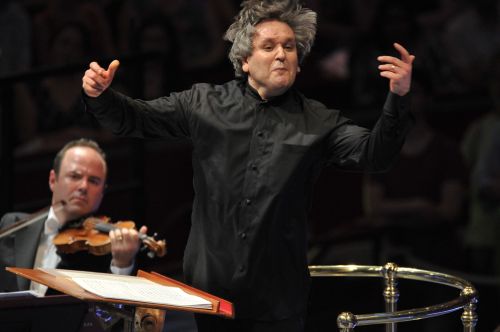 United Kingdom PROM 10: Mozart, Schumann, Rachmaninov: Jan Lisiecki (piano); Orchestra of the Academy of Santa Cecilia, Rome/Sir Antonio Pappano. Royal Albert Hall, London, 19.7.2013 (CC)
United Kingdom PROM 10: Mozart, Schumann, Rachmaninov: Jan Lisiecki (piano); Orchestra of the Academy of Santa Cecilia, Rome/Sir Antonio Pappano. Royal Albert Hall, London, 19.7.2013 (CC)
Mozart – Symphony No. 35 in D, K385, “Haffner”
Schumann – Piano Concerto in A minor
Rachmaninov – Symphony No. 2 in E minor

This, the first of two Proms this evening, was the first of a pair to be given in this year’s season by Sir Antonio Pappano and the Santa Cecilia Orchestra.
In one sense this first Prom of the evening was a very traditionalist programme. It also represented a chronological progression from the 18th century through to the early 20th – it could easily be argued that Prom 11, later in the evening, would wrench us via a quantum leap to the opposite end of the twentieth century. Rachmaninov to late Stockhausen is a long way to go.
The Mozart symphony was the ideal opener. The Santa Cecilia Orchestra, back in 1908 the first Italian orchestra to devote itself to purely symphonic works, has had Pappano as Music Director since 2005, and their rapport and mutual fondness is palpable. Characteristically baton-less, Pappano directed a reading that was fleet, bright and perfectly articulated. Antiphonal violins helped provide clarity and balance. A lack of repeats probably underlined the impression of briskness, but there was no denying the effectiveness of the lithe approach – the finale seemed to pre-echo Figaro, punctuated by hard-sticked timpani strokes. Character to spare.
A lot has been made of the talent of young pianist Jan Lisiecki who was making his Proms debut and, on present evidence, the fuss is entirely justified. Lisiecki’s tone was perhaps surprisingly brittle at the opening of the Schumann concerto, especially in contrast to the orchestral warmth – including the eloquent oboe. Yet thereafter lines from Lisiecki were beautifully projected; more, he has fire in his belly and so was able to give a reading of the concerto characterised by notable drama. In Pappano he found a sympathetic collaborator, one who whipped up great excitement in the lead-in to the first movement cadenza. The cadenza itself was remarkably intelligent, a considered account that included some double trills that were quite remarkably even.
Lisiecki’s technique is clearly hardly troubled by Schumann’s demands. He is a mere 18 years old and yet plays with a maturity well in advance of those years. Canadian-born to Polish parents, he was as happy delivering exquisite mezzo-staccato in true dialogue with the orchestra in the slow movement as he was in the fluency of the finale. He has the maturity to be able to give solos space, without becoming overly languorous. Perhaps there was a needless touch of harshness to some accents in the finale, but this was a mightily impressive performance. An encore: an entrancing Chopin Nocturne in C sharp minor (the Op. posth one).
The Rachmaninov symphony received quite a remarkable performance, lean and powerful. The orchestra knows the piece well, of course, given they have recorded it with Pappano for EMI (review). The performance was a fine one. Pappano understands the dark opening perfectly, although perhaps the strings did not quite have a great body of sound. Pappano ensured that the music’s ebb and flow was honoured, his hands sculpting the music effortlessly. Rachmaninov’s great grey turbulent passages were particularly powerful and ominous here. The orchestra seemed to enjoy itself most in the fiery Scherzo – plenty of energy, particularly in the fugato towards the end. The famous slow movement necessitates a mention for the liquid legato and melting tone of principal clarinet, Alessandro Carbonere. The true triumph was the finale, though, and there credit really falls with Pappano not only for imbuing it with so much energy, but also in presenting a reading of the utmost cogency in a movement that can so easily sprawl.
Given the enthusiastic applause and the fact that this is a visiting orchestra, an encore was both expected and granted: Ponchielli’s “Dance of the Hours”.
An interesting and varied evening. There was an intermittent high-pitched whistle audible during the first half which was notably off-putting. Perhaps it somehow reflected a rather restless audience (in contrast, the audience for the later Stockhausen Prom, which I attended, was perfectly behaved. It was good to hear this august orchestra, though, and Pappano continues to impress in just about everything he touches.
Colin Clarke